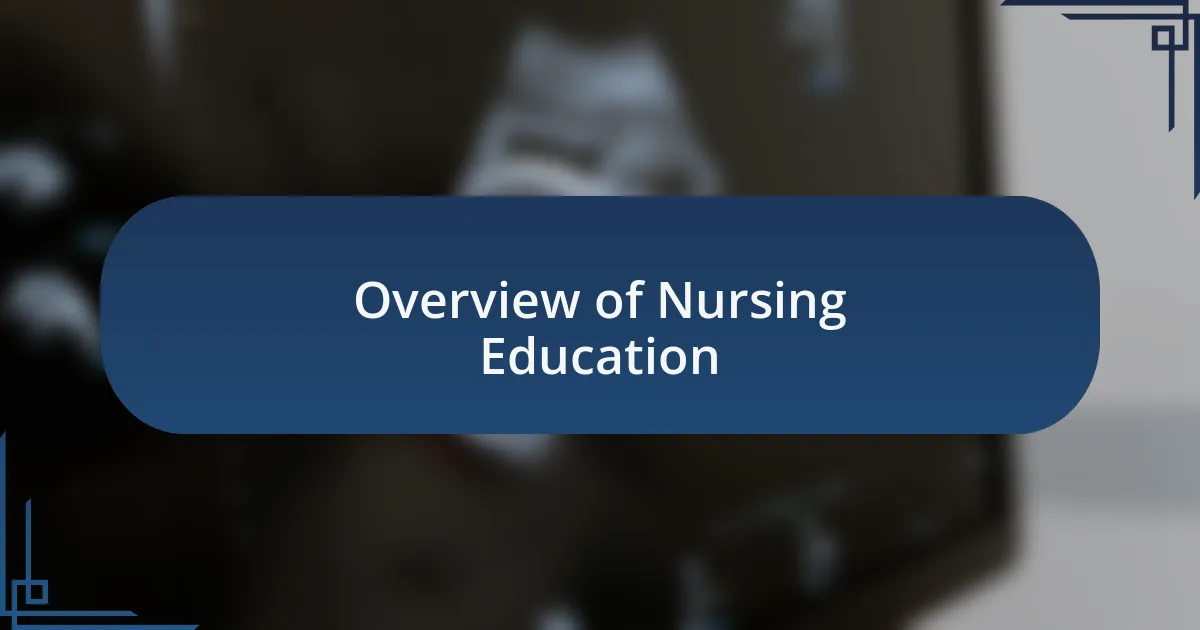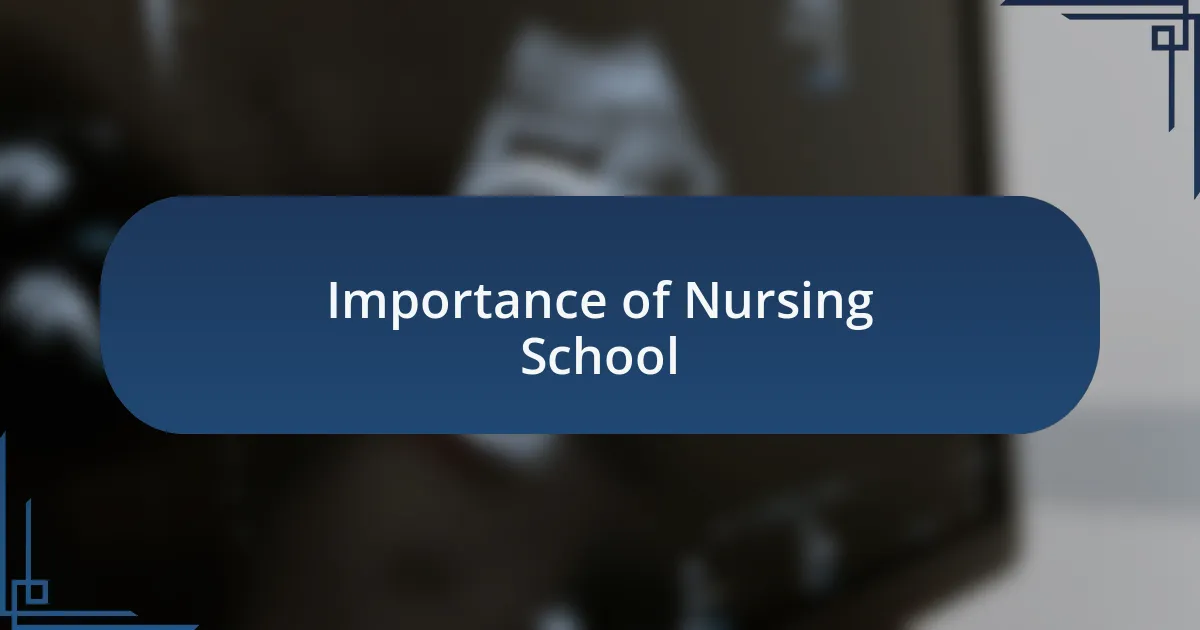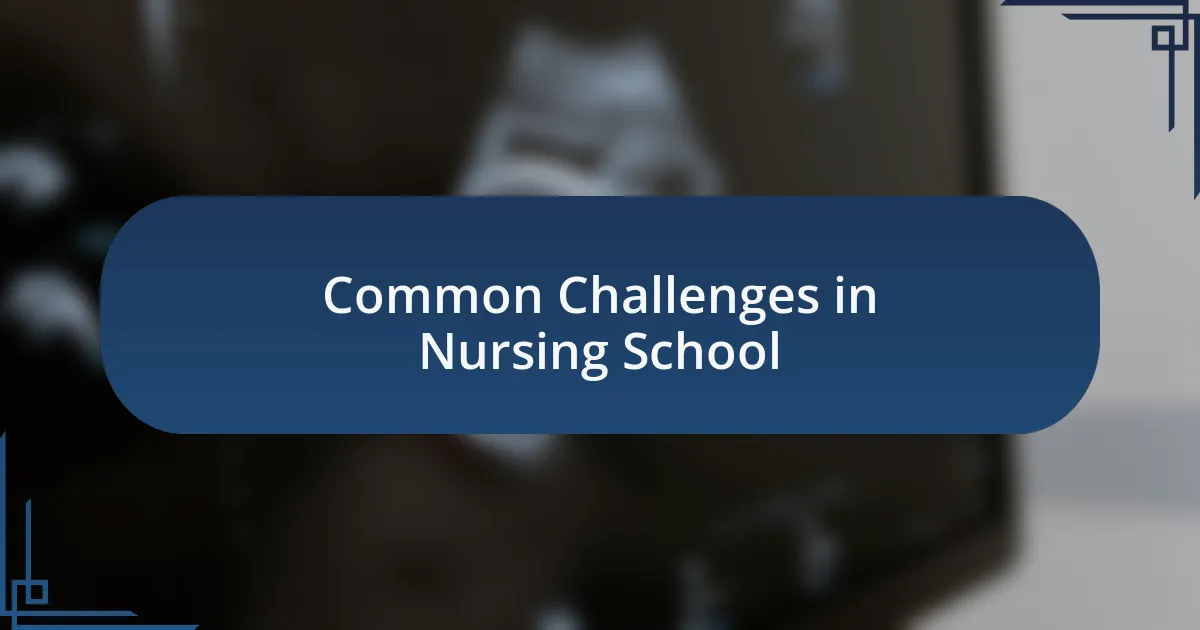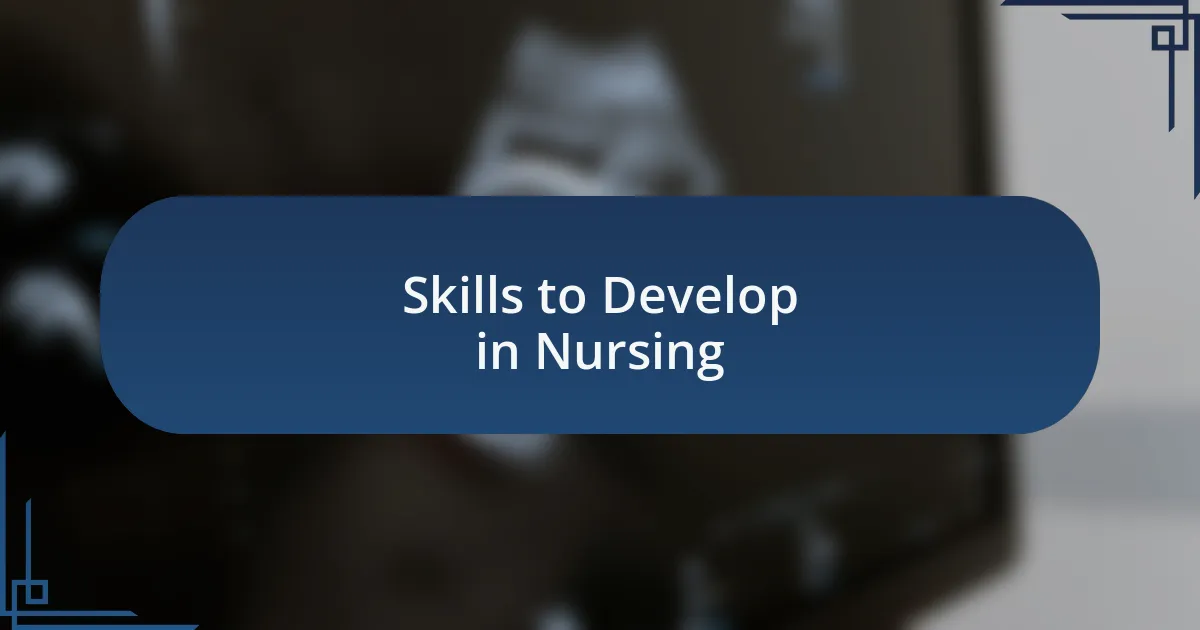Key takeaways:
- Nursing education combines theoretical knowledge with practical experience, emphasizing hands-on training and emotional intelligence.
- Nursing school prepares students for real-world responsibilities, focusing on teamwork, ethics, and critical decision-making skills in high-pressure environments.
- Common challenges include managing workload, emotional resilience, and finding effective personal study strategies.
- Key skills for success in nursing include effective communication, time management, and critical thinking, alongside the importance of self-care in maintaining academic performance.

Overview of Nursing Education
Nursing education encompasses a range of programs designed to equip students with the knowledge and skills necessary to care for patients effectively. During my time in nursing school, I experienced first-hand the pressure of juggling rigorous coursework and clinical rotations. Those late-night study sessions weren’t just about learning facts—they were about forging connections with classmates and discovering my own resilience.
Did you know that nursing education isn’t just confined to textbooks and lectures? Many programs emphasize hands-on experience in clinical settings, where I found myself applying theoretical knowledge to real-world situations. I remember helping a patient in recovery, and it hit me just how important every detail of our training was. This blend of theory and practice is what truly shapes a nurse’s ability to respond to patient needs.
In addition to practical skills, nursing education fosters critical thinking and emotional intelligence. Reflecting on my experiences, I often wish I had been initially aware of the emotional toll of patient care. How do we prepare ourselves for the heart-wrenching moments that come with the territory? Understanding this aspect is essential, and I believe it’s crucial for future nurses to seek resources and support to navigate these challenges effectively.

Importance of Nursing School
Nursing school is vital because it serves as the foundation for a successful career in nursing. I vividly remember the overwhelming sense of responsibility I felt when I first interacted with patients during my clinicals; it was clear that the education I received was not just about passing exams but truly preparing me to make critical decisions in high-pressure environments. Can you imagine trying to comfort a family during a medical crisis without the proper training? That’s where the importance of structured education really shines.
Moreover, nursing programs emphasize teamwork and collaboration. I often recall the simulation exercises where we would work together in a controlled setting, mimicking real-life scenarios. Those moments taught me how to communicate effectively with not only my peers but also with interdisciplinary teams. Because of this emphasis on collaboration, I developed a deep appreciation for the collective effort it takes to provide quality healthcare.
Lastly, nursing school plays a crucial role in shaping a nurse’s ethical and professional standards. Reflecting on the code of ethics we studied, I realize now how pivotal those discussions were in guiding my moral compass. It made me think: how would I navigate tough situations in patient care? The education I received has been instrumental in helping me embody the values that are essential for maintaining trust and integrity in the healthcare profession.

Common Challenges in Nursing School
Nursing school presents a variety of challenges that can test even the most determined students. One of the most daunting aspects, in my experience, was managing the workload. Between lectures, clinical hours, and assignments, I often felt like I was juggling a never-ending number of balls in the air. Have you ever faced a time crunch where every second felt crucial? I remember those late nights trying to grasp intricate concepts while fighting off exhaustion; it often felt like a race against time.
Another challenge that stood out to me was the emotional toll of connecting with patients while still being in a learning phase. During my first clinical rotation, I encountered a patient who was deeply distressed. I felt this surge of empathy mixed with a fear of not knowing the right thing to say. It was a moment that tested my resolve and reminded me how vital emotional intelligence is in nursing. How do you balance compassion with the need to remain professional? That question lingered long after that shift ended.
Lastly, figuring out my personal study strategies was another hurdle. I quickly learned that what worked for others didn’t necessarily work for me. I had to explore different techniques, from group study sessions to quiet solo revising, to find my groove. This trial-and-error method was crucial in developing my confidence and comfort with the material. Have you ever felt stuck in a study rut, unsure of how to move forward? Recognizing that it was okay to adjust my approach made all the difference in my academic journey.

Skills to Develop in Nursing
When it comes to nursing, effective communication is a skill I wish I had prioritized earlier. In my early clinical days, I found myself overwhelmed with medical jargon, forgetting that my patients weren’t familiar with these terms. I remember sitting beside an anxious patient, trying to explain their diagnosis while seeing the confusion in their eyes. It hit me then: how you communicate can either build trust or create barriers. Have you ever watched someone struggle to understand something crucial? I realized that breaking things down into simpler language not only eased their fears but made me a better caregiver.
Another critical skill that deserves attention is time management. In those hectic shifts, I often felt like a chicken with its head cut off, bouncing from one patient to the next. There was that one night when I was assigned five different patients, all needing urgent care simultaneously. It was a chaotic whirlwind, but I learned to prioritize tasks based on urgency and complexity. You might wonder how to maintain calm in chaos? I’ve found that making quick assessments and delegating when possible can significantly enhance workflow and keep stress at bay.
Lastly, honing your critical thinking abilities is indispensable. I recall a moment during my nursing training when I had to make a quick decision regarding a patient’s medication adjustment. The pressure was on, and there was no time to hesitate. In that split second, my instincts kicked in, informed by the thorough clinical training I had received. Have you ever experienced that surge of adrenaline while having to think on your feet? Cultivating a mindset of inquiry and reflection not only prepares you for emergencies but also nurtures a deeper understanding of patient care.

Tips for Successful Studying
When it comes to successful studying, finding a method that resonates with you is crucial. I remember struggling with traditional rote memorization, feeling frustrated as the information simply slipped away. It wasn’t until I adopted visual aids, like charts and mind maps, that I truly grasped complex concepts. Have you ever experienced that “aha” moment when the material suddenly clicks? It’s absolutely transformative.
Another effective strategy I discovered is the power of group study sessions. Early on, I was hesitant to share my thoughts, worried about being judged. However, as I opened up in a supportive environment, I recognized the value of collaborative learning. By discussing topics aloud with peers, I not only deepened my understanding but also retained information much better. Think about it: aren’t discussions often more illuminating than solitary readings?
Lastly, don’t underestimate the importance of self-care in your study routine. I vividly recall a week during finals when I prioritized studying over sleep and meals. By the end, I felt burnt out and less effective in my studies. Now, I advocate for regular breaks and healthy routines, which keep my mind sharp and focused. Have you noticed how a fresh perspective can often lead to clarity? Balancing study time with self-care is key to maintaining both mental and physical health.